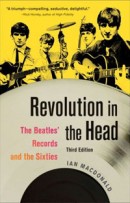 A friend recently introduced me to Revolution in the Head by Ian MacDonald, an addictive song-by-song analysis of the Beatles’ career. In its obituary for MacDonald (who committed suicide in 2003 at the age of 54), the Guardian wrote:
A friend recently introduced me to Revolution in the Head by Ian MacDonald, an addictive song-by-song analysis of the Beatles’ career. In its obituary for MacDonald (who committed suicide in 2003 at the age of 54), the Guardian wrote:
MacDonald carefully anatomised every record the Beatles made, drawing attention to broad themes, particular examples of inspiration and moments of human frailty alike.
What could have been a dry task instead produced a volume so engagingly readable, so fresh in its perceptions and so enjoyable to argue with that, in an already overcrowded field, it became an immediate hit.
The book was originally published in 1994, and has been revised a couple of times since. MacDonald’s voice here is conversational and deeply intelligent. He was obviously a fan—he was given access to the band’s master recordings for this project, and going through them as carefully as he did would require fandom—but he’s not overly reverent. In fact, he’s often most entertaining when tearing a song down, as he does here:
If any single recording shows why The Beatles broke up, it is “Maxwell’s Silver Hammer.” Compulsively fertile in melody and fascinated by music’s formal beauties, McCartney could, when unrestrained by Lennon’s cynicism, fatally neglect meaning and expression. This ghastly miscalculation—of which there are countless equivalents on his garrulous sequence of solo albums—represents by far his worst lapse of taste under the auspices of The Beatles.
Or this, about “Across the Universe”:
Sadly, its vague pretensions and listless melody are rather too obviously the products of acid grandiosity rendered gentle by sheer exhaustion. [. . .] [I]t gradually dissolved into a morass of out-of-tune wahwah guitar and squeaky backing vocals by two of the band’s teenage girl fans who stood sentinel all day outside Abbey Road and who were asked in on the spur of the moment.
In a recent review of the book, John Carvill wrote, “It’s a sign of how persuasive a critic [MacDonald] is that the impulse is not to scoff at his harsh assessment[s], but to feel impelled to at least think twice before moving on.” The perfect example of that, to this reader, is MacDonald’s conclusion about “Here Comes the Sun”: “Prettily atmospheric, the result is a little too faux-naïf to appeal to those lacking the requisite sweet tooth.” My instinct should be to argue against this, since “Here Comes the Sun” is one of my favorite Beatles song. But if I’m honest, MacDonald is right; I just have that sweet tooth.
Even when MacDonald started with a truism (as when he wrote that “We Can Work It Out” is “a classic instance of Lennon and McCartney collaborating as equals”), he quickly moved on to more complicated thoughts:
McCartney wrote the words and music to the eight-bar verse/chorus, Lennon the words and music to the sixteen-bar middle. . . . The usual critical line, derived from Lennon’s remark to this effect to Playboy in 1980, is that his section is impatiently realistic beside the cajoling optimism of McCartney’s part. This, though, misreads the song, which is not only tersely forthright throughout, but tough in passages which Lennon had no hand in.
Carvill again: “Scholarly yet irreverent, highly serious but always richly entertaining, the book not only sends the reader back to the music it describes, but also repays repeated readings.” All true. If you’re a fan of the band, I highly recommend MacDonald’s Revolution.

